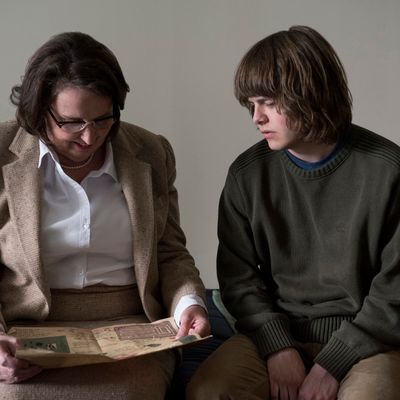
Halfway through The OA’s run, we may have found the big secret at its center. Whisked away once more to the land of death at episode’s outset, Prairie gets a tip (and a delicious live bird to eat) from her face-painted spirit guide, Khatun (Hiam Abbass). The instruction basically amounts to: You are here to do good for others on earth, and should death come for you, it’s just “a mistake.”
It’s quite a lucky break that death doesn’t matter for the four prisoners in the basement, since we also learn that Hap is killing them over and over for his secret experiments, drowning them in little death contraptions while they’re too drugged-up from his toxic gas to remember, then monitoring their brain waves to see where they go in between mortal coils. What I wrote off in the last hour as another go-nowhere Netflix narrative has turned out to be instrumental buildup to this rollicking installment, with all its fast-moving parts and constant sense of striving for freedom. Lording over all is a tight-lipped Jason Isaacs, who somehow can hold you prisoner and constantly torture you while making you believe he really does feel sorry for all of it.
Of course, some of the logistics of Hap’s mad-scientist plan work better than others. This “devil’s gas,” which puts the prisoners under a persuasion spell while also wiping their memories, is a little too narratively convenient to be truly scary — not to mention it has too much in common with the villain’s powers in Jessica Jones. But the suspense is palpable once the prisoners realize that in order to survive, one of them will have to pretend to be under the spell no matter what happens. It would be fair to question whether the OA is telling the full truth to her compadres in her flashbacks, or if this is all some elaborate, Life of Pi–style fantasy to obscure some horrible truth and teach a lesson to the five needy souls who’ve gathered to hear it. If that does end up being the case, the horror of these captivity scenes would be the biggest red herring.
The OA is playing with a mix of clear-eyed spirituality and sinister science that wouldn’t be out of place in a Steven Spielberg film or, in a very different way, a Terry Gilliam project. It was smart to wait this long to bring out the theology, although choosing to have the chosen people specifically refer to themselves as “angels,” absent any more pointed Biblical talk, has Prairie and her crew writing checks their environment can’t cash. (Where’s heaven? Where’s hell?) But it’s refreshing to see a piece of mass entertainment tackle death, rebirth, and afterlife with the kind of maturity, poeticism, and curiosity that Marling and Batmanglij bring to this material. There’s a giant beating heart at the center of The OA, a heart that’s more important to its creators than displays of cleverness.
So, what is the message? Alternating the metaphysical world of the flashbacks with the importance of being good to each other in the present day would seem to point to a tidy moral about where true angels lie, like something you might see in a weirdo Will Smith movie (or, well, Life of Pi). But The OA is too smart to settle for that, and the reason we know this is Homer. He’s being positioned as a tragic figure, someone who must face death at its doorstep again and again until he can master it, a man on an “odyssey” of a different kind. And he’s developing a special, possibly romantic bond with Prairie that will tie in some way to the immense guilt the OA feels in the present day. After all, Homer’s current whereabouts are still unknown. The OA’s brief conversation with the FBI agent implies that he, Scott, and Rachel may still be imprisoned, but her digital communion in the first episode suggests a deeper story that’s yet to be told.
Either way, Emory Cohen’s open, generous performance turns Homer’s vulnerability into the mammoth, front-and-center fact that drives our compassion. Apologies for my misreading of the character’s motivations as selfish in episode three; because he has such palpable fear, yet can’t shake those selfless qualities inherent within him, it seems pretty clear that Homer is the show’s conscience. He feels, as the OA says fellow captive Scott does not, “the rush that bravery gives you.” In a strange way, we feel it, too.
Stray Observations:
- Riz Ahmed alert! The Night Of’s beleaguered prime suspect jumps to the other side of the law to play the OA’s sympathetic ally in the FBI, someone more interested in aiding victims than catching bad guys.
- The visual palette of this show continues to astonish me, and this episode is the richest to date: the impossible swirling galaxies on the interior of the hut where Khatun waits; the symmetrical sight of the two draped women huffing purple gas from inside their glass chambers; the all-white alien architecture of the local FBI bureau; the death contraption that’s lowered onto Homer’s head and fastened with medieval-looking attachments; and especially the contrast in visions between Prairie’s and Homer’s deaths, hers a kindly tableau on a mountaintop, his a slippery, unpleasant chase through a sterile, sinister office environment.
- Phyllis Smith gets her moment to shine in this episode, becoming so overwhelmed by the OA’s angelic declaration that she’s able to finally come to terms with her brother’s death. It’s touching to watch her halting, yet kind, interactions with the boys as they joyfully discover her brother’s old punk CDs and era-spanning outfits.
- So what do we think “The OA” stands for? “Original Angel”?

